Chinese warplanes made 159 incursions into Taiwan’s air defense identification zone last month, Agence France-Presse data showed, the second-highest monthly number on record.
Beijing has ramped up pressure on Taiwan since President Tsai Ing-wen (蔡英文) took office in 2016.
Over the past 14 months, the sabre-rattling has reached new peaks after Beijing began sending an increasing number of warplanes into the zone, which Chinese military aircraft had previously largely avoided.

Photo: Ministry of National Defense / EPA-EFE
The escalatory moves have heightened fears among Western allies that China could order an invasion of Taiwan, even if they consider it unlikely for now.
On Tuesday, the Pentagon unveiled plans to reinforce deployments and bases directed at China, upgrading and expanding military facilities in Guam and Australia.
In Taipei, the Ministry of National Defense began making the Chinese warplane incursions public in September last year and AFP has built a database collecting details of the flights, which have been increasing in size and frequency.
November was the third month in a row in which more than 100 warplanes have made forays.
The incursions last month included 100 by fighter jets and nine by China’s nuclear-capable H6 bombers.
Beijing has stuck to probing the southwestern part of zone.
Near-daily smaller flights means Taiwan’s fleet of fighters is regularly scrambled, while Beijing also sometimes sends larger numbers to show displeasure over specific events.
October remains the busiest month on record with 196 incursions, 149 of which were made over just four days as Beijing marked China’s National Day.
Last month saw fewer large-scale incursions, but a near-daily trickle of planes.
“The recent situation is particularly grim with almost non-stop” incursions, Minister of National Defense Chiu Kuo-cheng (邱國正) said on Monday, after a sortie by 27 Chinese aircraft the day before, the biggest of the month, but only the fifth-largest daily incursion on record.
China’s “intention is to slowly exhaust [us], to let you know that we have this power,” Chiu said.
Chiu has previously warned that military tensions between Taiwan and China are at their highest in four decades, adding that Beijing would be in a position to launch a full-scale invasion by 2025.
Since the ministry first began making the forays public, more than 1,000 flights have been made.
A defense report released by the ministry last month said that China’s “frequent manipulation of gray-zone threats” such as the warplane incursions, are aimed at “seizing Taiwan without a fight.”

CHANGING LANDSCAPE: Many of the part-time programs for educators were no longer needed, as many teachers obtain a graduate degree before joining the workforce, experts said Taiwanese universities this year canceled 86 programs, Ministry of Education data showed, with educators attributing the closures to the nation’s low birthrate as well as shifting trends. Fifty-three of the shuttered programs were part-time postgraduate degree programs, about 62 percent of the total, the most in the past five years, the data showed. National Taiwan Normal University (NTNU) discontinued the most part-time master’s programs, at 16: chemistry, life science, earth science, physics, fine arts, music, special education, health promotion and health education, educational psychology and counseling, education, design, Chinese as a second language, library and information sciences, mechatronics engineering, history, physical education

DEADLOCK: As the commission is unable to forum a quorum to review license renewal applications, the channel operators are not at fault and can air past their license date The National Communications Commission (NCC) yesterday said that the Public Television Service (PTS) and 36 other television and radio broadcasters could continue airing, despite the commission’s inability to meet a quorum to review their license renewal applications. The licenses of PTS and the other channels are set to expire between this month and June. The National Communications Commission Organization Act (國家通訊傳播委員會組織法) stipulates that the commission must meet the mandated quorum of four to hold a valid meeting. The seven-member commission currently has only three commissioners. “We have informed the channel operators of the progress we have made in reviewing their license renewal applications, and

The High Prosecutors’ Office yesterday withdrew an appeal against the acquittal of a former bank manager 22 years after his death, marking Taiwan’s first instance of prosecutors rendering posthumous justice to a wrongfully convicted defendant. Chu Ching-en (諸慶恩) — formerly a manager at the Taipei branch of BNP Paribas — was in 1999 accused by Weng Mao-chung (翁茂鍾), then-president of Chia Her Industrial Co, of forging a request for a fixed deposit of US$10 million by I-Hwa Industrial Co, a subsidiary of Chia Her, which was used as collateral. Chu was ruled not guilty in the first trial, but was found guilty

Taiwan People’s Party (TPP) Chairman Huang Kuo-chang (黃國昌) yesterday appealed to the authorities to release former Taipei mayor Ko Wen-je (柯文哲) from pretrial detention amid conflicting reports about his health. The TPP at a news conference on Thursday said that Ko should be released to a hospital for treatment, adding that he has blood in his urine and had spells of pain and nausea followed by vomiting over the past three months. Hsieh Yen-yau (謝炎堯), a retired professor of internal medicine and Ko’s former teacher, said that Ko’s symptoms aligned with gallstones, kidney inflammation and potentially dangerous heart conditions. Ko, charged with